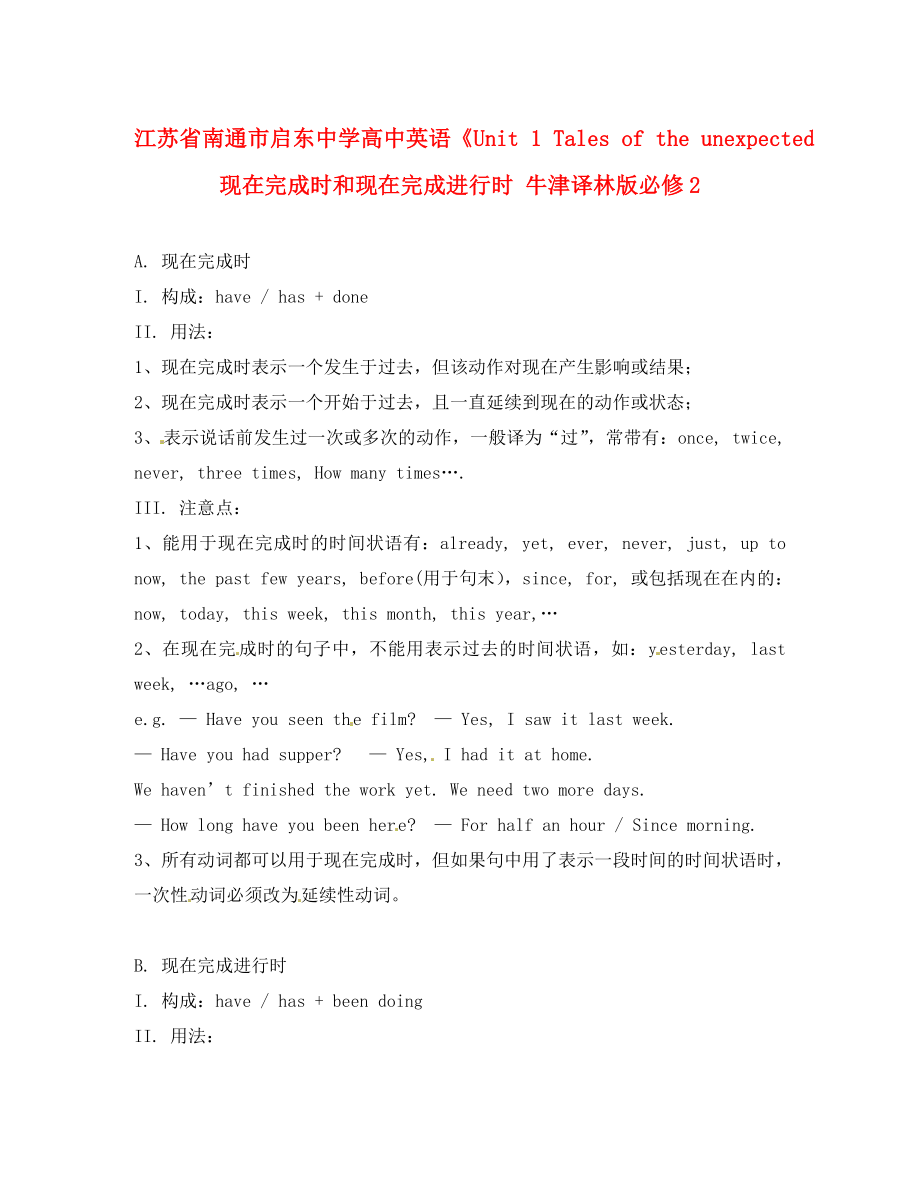《江蘇省南通市啟東中學(xué)高中英語《Unit 1 Tales of the unexpected 現(xiàn)在完成時(shí)和現(xiàn)在完成進(jìn)行時(shí) 牛津譯林版必修2》由會員分享,可在線閱讀��,更多相關(guān)《江蘇省南通市啟東中學(xué)高中英語《Unit 1 Tales of the unexpected 現(xiàn)在完成時(shí)和現(xiàn)在完成進(jìn)行時(shí) 牛津譯林版必修2(2頁珍藏版)》請?jiān)谘b配圖網(wǎng)上搜索���。
1�����、江蘇省南通市啟東中學(xué)高中英語《Unit 1 Tales of the unexpected 現(xiàn)在完成時(shí)和現(xiàn)在完成進(jìn)行時(shí) 牛津譯林版必修2
A. 現(xiàn)在完成時(shí)
I. 構(gòu)成:have / has + done
II. 用法:
1�����、現(xiàn)在完成時(shí)表示一個(gè)發(fā)生于過去�,但該動作對現(xiàn)在產(chǎn)生影響或結(jié)果���;
2����、現(xiàn)在完成時(shí)表示一個(gè)開始于過去,且一直延續(xù)到現(xiàn)在的動作或狀態(tài)�;
3、表示說話前發(fā)生過一次或多次的動作�����,一般譯為“過”��,常帶有:once, twice, never, three times, How many times….
III. 注意點(diǎn):
1����、能用于現(xiàn)在完成時(shí)的時(shí)間狀語有:already,
2、 yet, ever, never, just, up to now, the past few years, before(用于句末)��,since, for, 或包括現(xiàn)在在內(nèi)的:now, today, this week, this month, this year,…
2���、在現(xiàn)在完成時(shí)的句子中�,不能用表示過去的時(shí)間狀語�,如:yesterday, last week, …ago, …
e.g. — Have you seen the film? — Yes, I saw it last week.
— Have you had supper? — Yes, I had it at
3、 home.
We haven’t finished the work yet. We need two more days.
— How long have you been here? — For half an hour / Since morning.
3�、所有動詞都可以用于現(xiàn)在完成時(shí),但如果句中用了表示一段時(shí)間的時(shí)間狀語時(shí)�,一次性動詞必須改為延續(xù)性動詞。
B. 現(xiàn)在完成進(jìn)行時(shí)
I. 構(gòu)成:have / has + been doing
II. 用法:
1�、一個(gè)剛結(jié)束的動作,但對現(xiàn)在造成了直接的影響�����。
e.g. — You look tired.
— Yes,
4���、I have been cleaning the room for three hours.
We have been working for five days this week. Now we shall have a good rest.
2�、一個(gè)發(fā)生于過去����,但一直延續(xù)到現(xiàn)在,且還要持續(xù)下去的動作����。
e.g. I have been teaching in this school for twenty years.
How long have you been studying English?
3、現(xiàn)在完成進(jìn)行時(shí)往往指動作帶有重復(fù)性����,而現(xiàn)在完成時(shí)無這一含義。
e.g. H
5���、ave you been meeting her recently? (經(jīng)常性)
Have you met her lately?
He has been phoning me every night for several weeks.
4���、現(xiàn)在完成進(jìn)行時(shí)比較生動��,含有明顯的感情色彩�,而完成時(shí)只強(qiáng)調(diào)一個(gè)事實(shí)�����,一種影響或結(jié)果�,無感情色彩。
e.g. What have you been doing? C.f. What have you done?
We’ve been waiting for you for a long time.
I’ve been doing my work regularly.
c.f. He is being friendly.
 江蘇省南通市啟東中學(xué)高中英語《Unit 1 Tales of the unexpected 現(xiàn)在完成時(shí)和現(xiàn)在完成進(jìn)行時(shí) 牛津譯林版必修2
江蘇省南通市啟東中學(xué)高中英語《Unit 1 Tales of the unexpected 現(xiàn)在完成時(shí)和現(xiàn)在完成進(jìn)行時(shí) 牛津譯林版必修2

